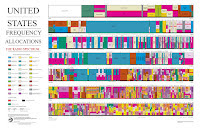A December 14 article in PCMag reports that satellite broadband provider HughesNet is now offering residential subscribers services with advertised download speeds of up to 100 Mbps. This is up from prior offerings of up to 25 Mbps and 50 Mbps downloads. The improved capabilities are the result of the high geostationary orbit Jupiter 3 satellite this summer, which apparently has now been tested and is ready for service.
According to the FCC's 2022 Communications Marketplace Report, "[a]s of year-end 2021, satellite operators served a combined 1.7 million subscribers in the United States." And subscriber numbers for GEO satellite broadband services offered by HugheNet and ViaSat do not appear to have grown but have perhaps declined slightly in recent years. (GEO providers as well as LEO entrants were subjects of my March 2018 blog, "Satellite Broadband Services Will Enhance Competition and Reach New Consumers.") But HughesNet's satellite service upgrade is a shot in the arm to broadband competition, and the Jupiter 3 will better enable HughesNet's geostationary orbit (GEO) broadband service to compete with Starlink's low earth orbit (LEO) broadband service.
Speaking of LEO broadband, PCMag also reports that a recent filing with the FCC shows that Starlink now serves approximately 1.3 million subscribers, or about 59% of the total satellite broadband subscriber base. And it is reported that Starlink recently received approvals to conduct testing of the cellular Starlink system that will transmit data to unmodified smartphones using T-Mobile’s licensed spectrum in the 1910-195 and 1990-1995 MHz bands.
(Much, much more could be said about the FCC's treatment of Starlink, and expect Free State Foundation scholars to weigh in on that in early 2024. For now, one ought to consider reading the order released by the Commission on December 12 and the separate statements by its members, including Commissioner’s Brendan Carr and Nathan Simington)
Future commercial availability of smartphone access to satellite broadband networks is another example of the broadband market's dynamism. For further background, see my March 2023 blog post, "Big Announcements on Deployments to Direct-to-Device (D2D) Satellite Services." Importantly, these broadband innovations that enhance competitiveness and expand access to unserved and underserved Americans ought to be promoted with a light touch regulatory policy and not by turning those services into heavily regulated public utilities, which the Commission has proposed to do. FSF's comments filed with the Commission on December 14 of this year make the case against imposing public utility regulation on broadband services – including satellite broadband. In order to be able to ensure that all Americans have access to broadband, it is essential that the Commission promote competition and innovation by satellite providers, not suppress it.














